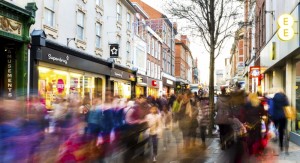 Black Friday might seem like a long time ago now, but the impact of this new phenomenon in the UK still ripples. Retailers such as Dixons Carphone embraced the shopping day and once the results were tallied, that turned out to be a good move. The retailer attributes the success to careful planning around promotions and supply chain in anticipation of Black Friday, which contrasts with press reports of other retailers not faring so well for the opposite reason - a lack of planning.
Black Friday might seem like a long time ago now, but the impact of this new phenomenon in the UK still ripples. Retailers such as Dixons Carphone embraced the shopping day and once the results were tallied, that turned out to be a good move. The retailer attributes the success to careful planning around promotions and supply chain in anticipation of Black Friday, which contrasts with press reports of other retailers not faring so well for the opposite reason - a lack of planning.
With all indications showing that Black Friday is in the UK to stay, it puts the pressure on for retailers to improve their planning. And considering the complexity of today's operating environment, effective planning means being able to balance multiple constraints and business goals simultaneously to consistently get the best result.
That process begins with better demand forecasting and builds from there into sensible decisions about how much of each product to have in stock and on the shelves.
The so-called ‘casualties’ of the UK’s Black Friday will need to be planning at a much more granular level. When it comes to the detail, it’s the unpredictability of the season that is proving a challenge. For example, Argos Chief Executive John Walden talks about being more strategic about what is put on sale - "balancing the things that make money versus the things that may not."
For me, this all points towards success being based on real knowledge and data. Crucially, knowing the difference between simple planning based on what happened the year before and much more accurate forecasting based on solid insights as to what will actually happen this year. Accurate forecasting based on solid insights is the difference between hindsight and the insight and foresight made possible from analytics.
This by no means applies exclusively to Black Friday. Retailers will be planning for the next big event, whether Valentine’s Day, Easter or Mother’s Day – but ask yourself and your colleagues what foresight does your organisation have? Our recent research with retail analysts Conlumino suggests nearly half of all retailers in the UK are still relying on gut instinct - certainly not the best approach.
A better way is to use historical data and current trading conditions to properly plan for future events. For even more details about the difference that analytics makes in retail, I encourage you to download this recent SAS report, EKN Report: 3rd Annual Analytics in Retail Study.

1 Comment
Great article! Predictive analytics is definitely on a tear right now and popping up in more and more industries.